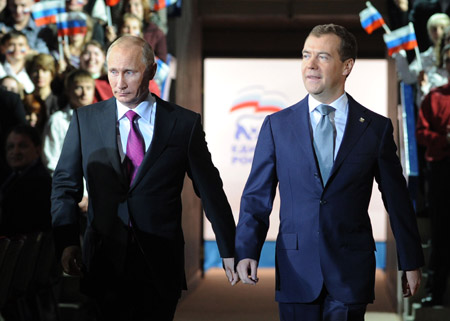Putin to run for Russian president in 2012
 0 Comment(s)
0 Comment(s) Print
Print E-mail
Xinhua, September 25, 2011
E-mail
Xinhua, September 25, 2011
Russian Prime Minister Vladimir Putin said Saturday he would run for president in 2012 and suggested President Dmitry Medvedev should become prime minister after the elections.
|
|
|
Russia's President Dmitry Medvedev (R front) and Prime Minister Vladimir Putin (L front) attend the United Russia congress in Moscow September 24, 2011. [Xinhua photo] |
ROLE SWITCH
Putin announced the long-awaited decision after being proposed by Medvedev at the ruling United Russia party's annual congress.
Putin, who currently serves as prime minister, also said he was confident Medvedev would become prime minister after the 2012 election and the ruling party would win the parliamentary elections in December.
"I am sure that United Russia will win and Dmitry Anatolyevich Medvedev will be able to build a new, efficient and young team and lead the government so as to continue modernization of all aspects of our lives," Putin was quoted by Interfax news agency as saying at the two-day congress, which began Friday in Moscow's Luzhniki sport complex.
In proposing Putin's candidacy, Medvedev said: "I believe it would be right if the congress support party leader Vladimir Putin's candidacy for president," he said.
Meanwhile, Medvedev agreed to head the ruling party's list for the Dec. 4 parliamentary elections, adding that he was ready to do some practical work in the government and continue modernization of the national economy.
The president also said he and Putin had "agreed long ago on who will do what following the elections."
"What we have proposed at the congress is a well-thought-out decision. Even more, we discussed, indeed, this version of developments at the time when our comradely union was formed," Medvedev said.
He hoped Russian citizens could trust the strategy and efficiency of the administration model set by him and Putin.
SUPPORTS AND CRITICISMS
Putin was president from 2000 to 2008 for two consecutive terms. Both Putin and Medvedev have previously indicated that one of them, but not both, will run in the 2012 presidential election.
Alexander Shokhin, head of the Russian Union of Industrialists and Entrepreneurs, said it was "very important" for the Russian political system that Medvedev and Putin revealed plans for their future roles in governing Russia.
Their decision would effectively rule out a lame duck scenario in the pre-election period, he said, adding that Medvedev's leading position in the United Russia's parliamentary election list would increase the party's election potential.
After accepting the proposal to run for presidency, Putin made a wide-ranging pre-election speech to the party congress Saturday, outlining his economic polices ahead of the presidential elections scheduled for March.
He said the Russian economic growth should speed up to 6-7 percent in the next few years, expressing confidence that Russia "in the next five years is to be among the five leading economies of the world."
He also promised to increase the employment rate and wage levels, to reform the tax system and to upgrade the army and navy.
However, Putin's presidential bid was widely criticized by Russian opposition leaders Saturday.
A Just Russia party leader Sergei Mironov told reporters his party would not support any presidential candidate nominated by United Russia.
Yabloko party leader Sergei Mitrokhin told Interfax "the reshuffle in the tandem does not imply renewal of government and has nothing in common with modernization."
Even so, most experts say the lack of a powerful opposition means the United Russia candidate will almost certainly win control of the Kremlin.
"The country's most influential person returns to the most powerful post," Carnegie Moscow Center analyst Maria Lipman said.






